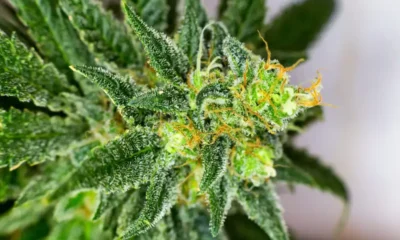Connect with us
Published
1 year agoon

It appears the hemp renaissance is continuing to gain momentum,with a number of hemp-made product alternatives steadily appearing on the market, boasting sustainability and environmental consciousness. One of the newest additions? India-based company Himalayan Hemp is setting its sights on hemp-based sanitary pads, The Hans India reports.
The company calls itself “the world’s first hemp co-operative focused on creating a holistic community around Indigenous cannabis hemp.” Along with its sanitary pads, Himalayan Hemp also plans to produce high-quality, organic sanitary napkins and N-95 masks.
The company also received funding from the Biotechnology Industry Research Assistance Council (BIRAC), a not-for-profit established by the Indian Government’s Department of Biotechnology. The innovative product from Himalayan Hemp pads is expected to hit the sanitary pads market soon.
According to the website, BIRAC was first founded eight years ago. In that time, it initiated a number of schemes, networks and platforms that help to bridge existing gaps in the industry-academia innovation research. It’s also facilitated high-quality, affordable product development through cutting edge technologies.
BIRAC describes its vision: “To stimulate, foster and enhance the strategic research and innovation capabilities of the Indian biotech industry, particularly start-ups and SME’s, for creation of affordable products addressing the needs of the largest section of society.”
A listing of BIRAC-sponsored projects mentions Himalayan Hemp Industries Pvt. Ltd., stating it received funding for “reusable and disposable Himalayan Hemp sanitary pads by using Indigenous cannabis-hemp fibres,” The Growth Op reports.
On the company’s website, Himalayan Hemp references how farmers, which it calls “one of the economically weakest sections” of the workforce, could benefit from the alternative option. Since hemp is a crop and gives high biomass per acre, it’s a more sustainable source of income, the company argues, given that menstruation is a consistent reality and farmers won’t run out of demand.
The company also mentions the amount of waste that goes into the existing model. According to Himalayan Hemp, an average sanitary pad pack has 36 grams of plastic, leading to 7,200 tons of unspoken tabooed biomedical plastic in waterways and landfills.
“Therefore, there is a high need to shift to reusable and biodegradable sanitary pads,” Himalayan Hemp argues.
While sustainability is paramount in this conversation, Himalayan Hemp Project Architect Shreyas Papanna told Hans India that health issues come into play as well. Papanna said that hemp plant stems are fiber rich and hemp-based sanitary pads are “completely organic and healthy.”
Menstrual hygiene has been a continuous challenge in India. As menstruation has historically been treated as taboo in the country, those in need have had limited access to menstrual education and basic sanitary care products. Business Insider reported in 2021, “nearly half of even urban-based women use unhygienic methods for period protection, making them vulnerable to health issues.”
Himalayan Hemp attests that, while there have been strides in menstrual health, the existing disposable sanitary pads used by menstruating people “continue to be the major reasons for ovarian cancer, cesarean cancer, skin dermatitis, hormonal dysfunction and thyroid based conditions.”
Cannabis is still illegal in India, though CXO Outlook reports that some states throughout the country have legalized hemp cultivation of crops with less than 0.3% THC, the same standard for the hemp industry in the U.S. and Canada.
It could take some time for cannabis to catch up in India and elsewhere, but it’s promising that hemp is still seeing this momentum. And the innovative, hemp-based alternatives seem to keep coming. Just this year, researchers have developed cost-effective, hemp-reliant batteries; a nonprofit and hemp farm teamed up to create tiny homes made of hemp; researchers have crafted a hemp-based rebar alternative and hemp could even play a role in the growing plant-based food market.
We have a lot of catching up to do regarding the hemp industry as a whole, but if the progress so far is any indication, we’re well on our way.


New York Cannabis Control Board Approves 101 New Adult-Use Licenses


Killer Pharmacist Who Diluted Life-Saving Drugs To Be Freed From Prison


Doctors Join Call To Regulate Intoxicating Hemp Cannabinoids


Is Your Tesla Self-Driving Car Narcing You Out?


Psychedelics Offer Long-Term Improvement in Sexual Functioning, Enjoyment


March Marks New High for Cannabis Sales in Michigan
